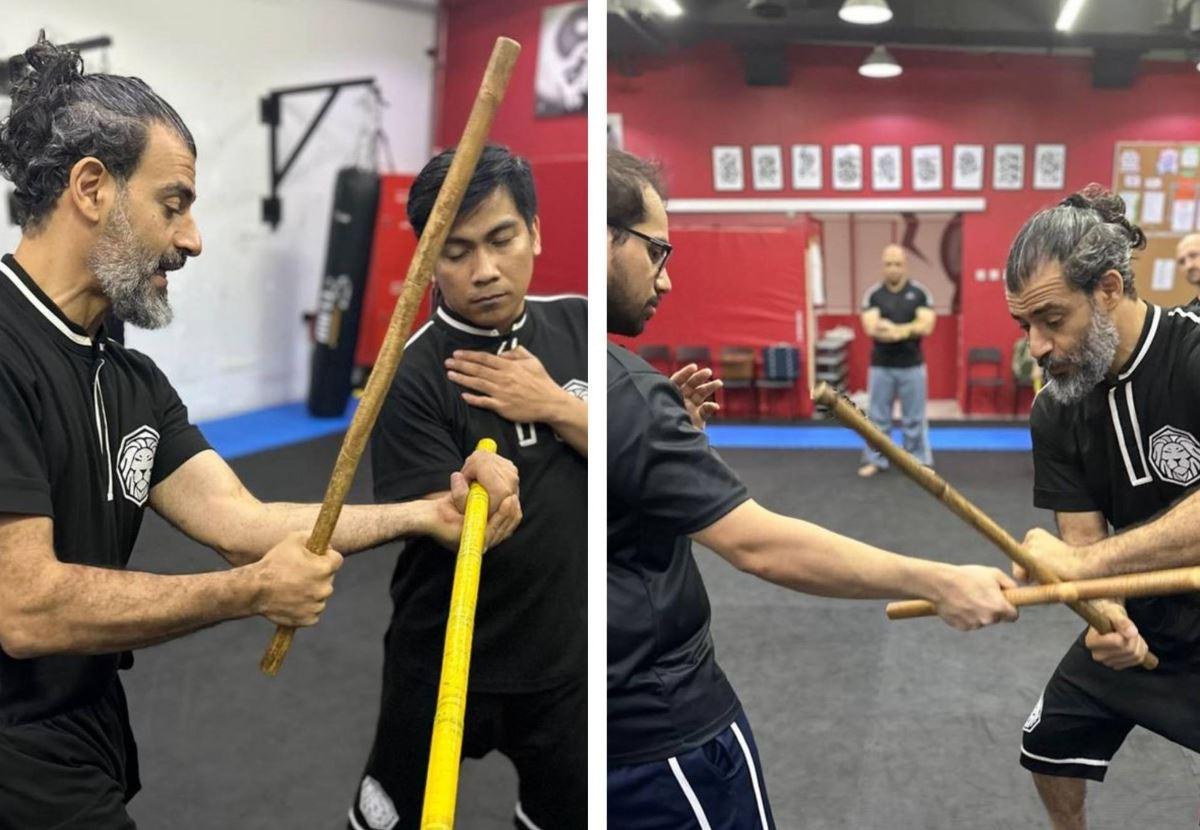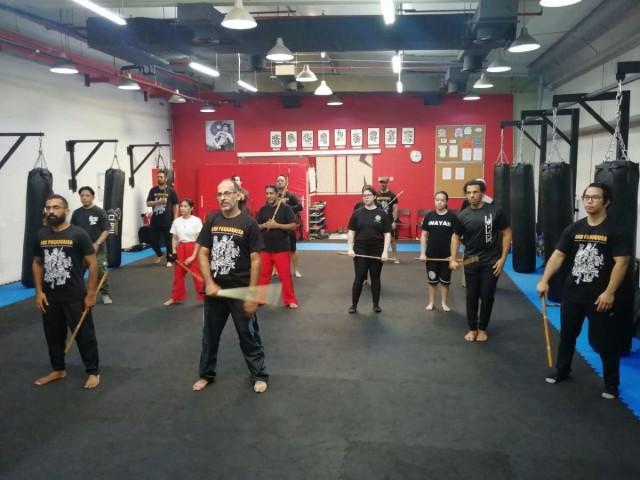Arnis gains popularity among Arabs in UAE; Pinoy masters want OFWs to get into it

DUBAI, United Arab Emirates – Arnis, national sport of the Philippines, is gaining popularity here, not among Filipinos, but with the Arabs.
As such, a typical Pinoy, who grew up being taught arnis in physical education (PE) classes during grade school, will be amazed – and probably a bit embarrassed – to know that an Emirati is leading efforts to spread the word about this ancient Filipino self-defense fighting technique in Dubai.
Arnis is called Filipino Martial Arts (FMA) in the same way contact sport enthusiasts have Mixed Martial Arts (MMA).
“It is very true that more non-Filipinos are embracing FMA. This strikes me as very positive,” said 50-year-old Wael Al-Sayegh, who has been practicing the martial art for the past 12 years.
Al-Sayegh, who in August 2012 opened his AlAreen Martial Arts Training, dubbed “Dubai home of Filipino Martial Arts,” said people are attracted to FMA because of its “completeness.” "AlAreen" is Arabic for “lion’s den.”
“It has everything in one system from weapons to empty hand, elbows, knees, kicks, throws, joint manipulations. I also loved its fluidity and adaptability,” said Al-Sayegh, who holds a Masters of Arts degree from the University of Glasgow in Scotland.

“I came across FMA as part of my search for the best way to defend myself and to find the most useful martial arts for my self-development as a human being,” Al-Sayegh added. He said he was first taught arnis by a British “guro” (teacher) named Mike Gregory, a senior FMA associate instructor.
Al-Sayegh said FMA will have a big positive impact in the UAE with international tournaments being held in the country. The self-defense martial art also has the potential to soon be included in police and army training, he said.
Next level
“We are working as a team to take FMA to the next level. I see a bright future,” Al-Sayegh.
Among those in the team were Filipino FMA Masters Ginalyn Jadia Relos, Louie Finuliar Rempillo and Eliseo ‘Boy’ Cañete, who, while expressing uneasiness over arnis not being as popular among Pinoys as it is with the Arabs and other nationalities, were nonetheless one in saying efforts were underway to put the Pinoy sport on the global stage, even in the Olympics.
For starters, they said plans were afoot to include arnis in regular events like Dubai Sports World (DSW), and be enlisted with the Dubai Sports Council (DSC). Similar efforts can also be done in Abu Dhabi.
“Iyan po ang goal namin – ang maipakita sa mundo ang beauty and effectiveness ng martial art natin,” said Abu Dhabi-based 51-year-old Relos, an insurance underwriter who’s been practicing arnis since 1990.
(It is our goal to show the world the beauty and effectiveness of our martial art.)
Uphill climb
Having more overseas Filipino workers (OFWs) practice the sport is an uphill climb, however, she hinted.
AlAreen Martial Arts Training recently held a day-long arnis showdown named “Ang Pagkakaisa” (The Unity) attended by arnis masters, instructors and students. All three were at the event.
Relos, who also is secretary general of the International Modern Arnis Federation Philippines (IMAFP), noted that there were more Arabs as well as people of other nationalities present at the event than Pinoys.
“Majority of the attendees were non-Filipinos. Two flew in from Saudi Arabia,” she said.
Relos, who has been teaching arnis for the past two years, also lamented that only about 20% of the participants at the 10th FMA World Festival, held in the Philippines from Feb. 25 to March 2 this year, were Filipinos. “And part of that 20% was with the organizing committee,” she said.
“I had also been guest instructor at the 2017 Deutcher Arnis Verband (DAV) Summer Camp in Germany and was amazed with the number of (European) participants – more than 200 – enjoying the art for the whole week,” Relos said. DAV is the biggest arnis group in Europe.
‘Arnis is Pinoy culture’
Cañete, meantime, said arnis is more than a martial art as it is part of the Filipino culture.
“Sinisikap po namin na ipalaganap dito sa ating mga kababayan at makita nila ang sariling martial arts po, ang FMA na bahagi ng ating kultura,” he said. (We try to spread the art of arnis to our fellow Filipinos for them to see our own martial arts, to see that FMA is part of our culture.)
Cañete, who learned arnis when he was 12 from his grandfather, has also been teaching it with Relos.
Snowball
Keeping the spirits high, 49-year-old Rempillo, inventory controller and parts analyst at a car dealership who’s been swinging the arnis stick since 1987, said it is hoped that Ang Pagkakasia could snowball into bigger events.
He said an encouraging development is the inclusion of arnis last year, through AlAreen Martial Arts Training, in the annual Dubai Fitness Challenge 30X30, which enjoins residents to take 30 minutes of their time for 30 days exercising or taking up sports.
“Ang Pagkakaisa ay magiging tulay natin para mapabilang sa UAE Sports Committee ang arnis,” said Rempillo. (The Unity will be the bridge that will connect arnis to the UAE Sports Committee.)
Noting that arnis has already made it to the SEA Games, Rempillo said “it won’t be long and arnis will be on the Olympic sports line-up, too.”
Relos said she is also looking forward to having an FMA World Fest in the UAE. “Events like this encourage not only more learning but as well promote tourism and business opportunities,” she said.
Rempillo has been teaching arnis for more than 15 years, starting in schools, barangays and security guard companies back in the Philippines, and now among British and American students in Dubai private schools.
Arnis, also known as eskrima and kali, is a national sport by virtue of Republic Act 9850 signed by then President Gloria Macapagal-Arroyo in 2009. —KG, GMA Integrated News





